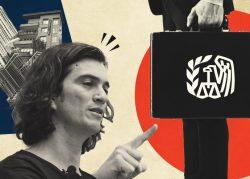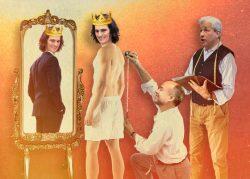A V-neck? For a meeting? With an investor?
Oh, Adam Neumann. You sweet summer child.
Whether comedy or drama, some of the best television centered around the workplace takes a deeper look at the spirit of the times. Behind the three-martini lunches, “Mad Men” showed us ugly truths about American society in the 1960s. “Silicon Valley” satirized tech bro culture of the 2010s. Even “The Office,” whose comedy often relied on the inherent contradictions of corporate culture in the early 2000s, is inextricably linked to its era.
Through this lens, “WeCrashed” can be seen as a post-Recession period piece about what can go wrong when ego, ambition and greed are combined.
Staged and scripted for the small screen, the Apple TV miniseries tells the story of former WeWork CEO Adam Neumann’s career — which was, in many ways, staged and scripted itself.
Its depictions of Neumann’s dealings with fictional backers like Yevgeny Risakov, or real ones like Jamie Dimon and Masayoshi Son, showed in dramatic detail what can go wrong when V-necked startups need buy-in from the old-guard suits of commercial real estate.
Read more



Before I learned how numbers worked, I loved throwing around the number 165. I’d ask for “165 books” from the library and complain about having to wait “165 years” to get them. Why 165? Well, I was five years old and it was the biggest number I could think of.
Jared Leto nails this childlike, delusional approach to money on “WeCrashed.” In nearly every episode, we hear Neumann gleefully yell out projected valuations like “45 billion!” “47 billion!” and, perhaps influenced by one particularly large bong rip, “a trillion.”
Members of the city’s real estate establishment may not be so outwardly brash, but they do seem to enjoy bouncing around colossal sums of money with equal fervor.
Watching Risakov’s “negotiation” with Neumann felt like observing a game of ping-pong, with huge dollar figures tapped lightly back and forth until both agreed on which one they liked best.
Of course, for every seasoned veteran who keeps it to a subtle flex, you also have kids like “bad boy landlord” Rafi Toledano, who, years before being banned from New York real estate by the state, once boasted to a TRD reporter, “I’m worth a fuckload of money, bro.”
We like to sneer at startup CEOs’ brand of conspicuous consumption, and real estate has always had its own “if you’ve got it, flaunt it” culture. The richest love their superyachts and chartered jets. New car smell means nothing to those who buy their Ferraris in bulk.
But if you don’t got it? Flaunt it anyway! Just like Leto’s Neumann did when his startup needed a financial reckoning.
Dipping into the red? No problem. Just hire a crisis team, “elevate the world’s consciousness” with another We-Something branded initiative and take a barefoot walk through the city to let everyone know what an unbothered free spirit you are.
Among these was WeGrow, the school — sorry — “educational branch” started by Neumann’s wife, Rebekah Paltrow Neumann (played by Anne Hathaway).
In one episode, Hathaway takes starchitect Bjarke Ingels (Vasile Flutur) through a vacant office floor, musing in a low-pitched, pretentious cadence about its potential as a space from which WeGrow could reinvent the very concept of education.
“I see clouds. And… a meadow, right? Oh, this is incredible! Can you feel the energy that we’re creating in here?”
The energy, as it turned out, would be rather expensive.
An unnamed adviser made the importance of optics clear to Neumann when he shared the “first rule” for succeeding in commercial real estate: “It’s not what you can see, it’s who can see you.”
But corporate mantras and optics can only take you so far. By the miniseries’ finale, WeWork’s IPO crisis left Neumann with no choice but to face the music.
Investors were catching on to the grift, and JPMorgan Chase’s Jamie Dimon, played by Campbell Scott, told Adam to maybe push back the IPO — or at least pick a valuation that wasn’t $47 billion.
You can only manipulate reality so much before you must reevaluate your delusions. In Adam’s case, he reevaluated them down to a meager $20 billion.
WeKnow how the story ends.
Early in the show, Softbank CEO Masayoshi Son, played by Kim Eui-Sung, asks Neumann whether it’s the smart one or the crazy one who wins a fight. In the series finale, he reveals the answer to the trick question: It’s the one with the money.
“Image is everything” is one of many empty phrases we hear time and again in each episode — and one that holds true in real life. Just look at @Traded, which has built a business around infinite scrolls of the flashiest commercial deals complete with smiling headshots of the brokers who pulled them off.
If image is everything, then what is @Traded if not, in the words of TRD’s Joe Lovinger, “real estate’s vanity mirror?”
“WeCrashed” is a visual feast of 2010s proto-nostalgia — from costuming to set design to Katy Perry.
Does it deliver stylized commentary on the American workplace? Yes. Does its script reflect the cult-like repetition of banal platitudes that Neumann called WeWork’s “company culture?” Absolutely. I came away from the last episode with about two brain cells but newfound empathy for the poor WeWork employees that had to hear this shit on a daily basis.
But above all else, it is pretty to look at. And isn’t that what really matters?